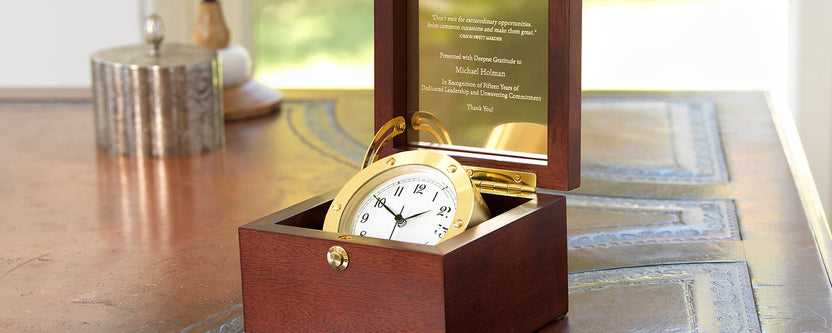Chelsea Clock Salvaged from SS Pendleton Rescue Featured in the Finest Hours Film "Keeps Perfect Time"
In late February 1952, a nor'easter hit off the coast of Cape Cod, so powerful that two T2 tankers split in half the same night. One of the tankers, the Fort Mercer, was able to radio for help; so by the time the Coast Guard discovered there was another ill-fated tanker in need of immediate aid, their resources and manpower had been extremely depleted. What happened next as four rescuers braved 60-foot seas and 70-knot snow-laced winds in a tiny motorized lifeboat to save 32 Pendleton survivors is the plot of Disney's gripping film The Finest Hours (out on DVD and Blue-Ray May 24th). We've recently discovered that leader of the rescue, Bernie Webber, was in possession of a Chelsea Clock that was retrieved from the Pendleton in the aftermath of the wreck. Webber kept the clock from 1966 to 1982, before gifting it to the Orleans Historical Society where it still resides and "still keeps perfect time." Here's the story of the Pendleton, the rescue, and the Chelsea Clock.
Built by the Kaiser Company in 1944, the SS Pendleton was a 503-foot, 10,448 Type T2-SE-A1 tanker built in 1944 in Portland, Oregon for the War Shipping Administration. In 1948, she was sold to National Bulk Carriers, a shipping company which owned and operated oil tankers. On February 12, 1952, she departed on a job from Baton Rouge, Louisiana, with a crew of 45 men and cargo including 122,000 barrels of kerosene and heating oil. On February 17, the Pendleton arrived off the coast of Boston late at night to extreme weather conditions and low visibility. The Captain, John Fitzgerald, opted to stand off and instead slowly head into Massachusetts Bay, but wind and sea conditions worsened. Sometime after 4 am, the vessel rounded the tip of Cape Cod off Provincetown.
At about 5:50 am on the morning of February 18, the crew heard a series of explosive cracking noises and then the sharp sound of bending metal as the Pendleton took a heavy lurch and snapped in two, leaving the bow section completely without power. The Captain and seven other crewmen aboard the bow perished at sea.
But the stern section maintained power and limited operational abilities. With the Captain gone, Chief Engineer Raymond Sybert took charge of the other 32 survivors as they continued to drift in mountainous seas nearly six miles off Cape Cod. Without a radio, which was lost with the bow, no S.O.S. would be issued.
At 3 pm, the Pendleton's stern section was spotted by the Coast Guard at Chatham Lifeboat Station. BM1 Bernard Webber was ordered to pick a crew and take the 36-foot CG-36500 MLB (built to hold only 12 men) over the treacherous Chatham bar to assist the survivors in the Pendleton's stern section. Only three men were available, since “other crew members had made themselves scarce when they heard that CG-36500 was to be sent out,” said Webber. The remaining men included the station’s junior engineer, Andrew Fitzgerald, Seaman Richard Livesey, and a crewman from the nearby Stonehorse Light Ship, Seaman Irving Maske. All three volunteered for the job.
Spoilers aside, Webber and his team successfully carried out a heroic rescue without a compass or visibility in the monstrous storm. Thirty-two men were eventually welcomed aboard CG-36500 and brought safely to shore in Chatham. Webber and the other rescuers immediately became local legends, and were awarded the Gold Lifesaving Medal for their heroism.
The following is an excerpt from Webber's memoir, "Chatham: the Lifeboat Men," published in 1985.
Within a few days of the wreck of the Pendleton in 1952, as soon as the seas subsided, some of the local seafaring folk, known affectionately to me as "The Chatham Pirates" clambered aboard the remains of the broken stern section.
Rumor had it of items found aboard and the stories ran high about the finds. Although close mouthed secrecy prevailed as the order of the day, for fear there might be some government or salvage claim, certain items stood out as cherished souvenirs and were talked about in hushed voices.
At the time, I had heard the rumors, and I must admit, I was envious because I had no souvenir--no remembrance from the Pendleton. As I was a member of the Coast Guard at the time, I never dared to go near the remains for fear of being caught and court-martialed should I take the least little thing.
Some 14 years later, shortly before retiring from the Coast Guard, I had an experience which meant a great deal to me. It had a great effect on my life and I'd like to share it with you now.
Coming home from Coast Guard service in Vietnam in 1966, I found myself disillusioned, depressed, confused, out of touch with people, politics and the Coast Guard--which I had served for nearly 21 years.
Friends from Eastham suggested that my wife and I accompany them a local Eastham restaurant. Upon arriving at the restaurant and seeing the large amount of cars parked outside, I suggested that we go to our house rather than stop. Our friends in whose carewe were riding said, "No, we're going to stop in." Upon entering the restaurant I was amazed at the crowd of people that were there, and that there were so many familiar faces. I said to my wife, "What do you think is going on here?" She pointed up to a sign that I had not noticed. It said, "Welcome Home, Bernie." It was a welcome home party. Needless to say, I was overwhelmed. The party progressed with the unusual camaraderie and human emotions of such an event. Out of the crowd a man walked up to me. He was an older man dressed in a wool overcoat and felt hat. He was clutching a brown paper bag under his arm. I then recognized him when he spoke as Harold Claflin, former harbormaster of Chatham. He said, "Welcome home, Bernie," while thrusting the brown paper bag he was carrying into my arms, saying further, "Here, this rightfully should be yours. I've had it for many years, since just after the shipwreck of the Pendleton." As I reached into the bag, I knew what Harold had given to me. I recognized it immediately as the ship's clock off the broken stern section of the Pendleton. He had obtained it just a few days after the disaster. When I looked up, Harold was gone. He had left as quickly as he had arrived. I never saw him again, but I cherish the relationship I had in working with and learning from Harold Claflin while he was harbormaster at Chatham. At the time I felt no man had received a greater gift or tribute than I. Not only was I welcomed home by friends and neighbors, but I received such a cherished possession from a dear friend and comrade.
Before his death in 2009, Webber presented his prized Chelsea Pendleton deck clock to the Orlean Historical Society as a thank you for their restoration work in preserving the little rescue boat CG-36500 in 1982. It's unlikely that Webber ever knew the clock he so cherished started its journey so close to his native Boston back in 1944. According to our record books, the Pendleton clock was sold to the U.S. Navy on May 17, 1944, and made its way aboard the Pendleton -- only to be retired in its native Massachusetts after surviving shipwreck.
For more information on the Pendleton rescue, click here. For more information about the Orleans Historical Society and the CG-36500, visit the society's website. Related:
>The Finest Hours Captain Leaves a Lasting Legacy

 Webber and his crew arrive back safely at their base with 32 of the Pendleton's survivors on board the Coast Guard motor lifeboat. EN3 Andrew Fitzgerald is on the bow ready to handle the tie up at the pier. Photo by Richard C. Kelsey, Chatham, Mass. Photo credit: Cape Cod Community College.
Webber and his crew arrive back safely at their base with 32 of the Pendleton's survivors on board the Coast Guard motor lifeboat. EN3 Andrew Fitzgerald is on the bow ready to handle the tie up at the pier. Photo by Richard C. Kelsey, Chatham, Mass. Photo credit: Cape Cod Community College.
 The original caption stated: "Rescuers discuss the rescue. Left to right are Coast Guardsmen Bernard Webber, who piloted the rescue boat; Engineman second class Andrew Fitzgerald, Seaman Richard Livesey and Seaman Irving Maske. Photo by Richard Kelsey, Chatham." Photo credit: Cape Cod Community College.
The original caption stated: "Rescuers discuss the rescue. Left to right are Coast Guardsmen Bernard Webber, who piloted the rescue boat; Engineman second class Andrew Fitzgerald, Seaman Richard Livesey and Seaman Irving Maske. Photo by Richard Kelsey, Chatham." Photo credit: Cape Cod Community College.








